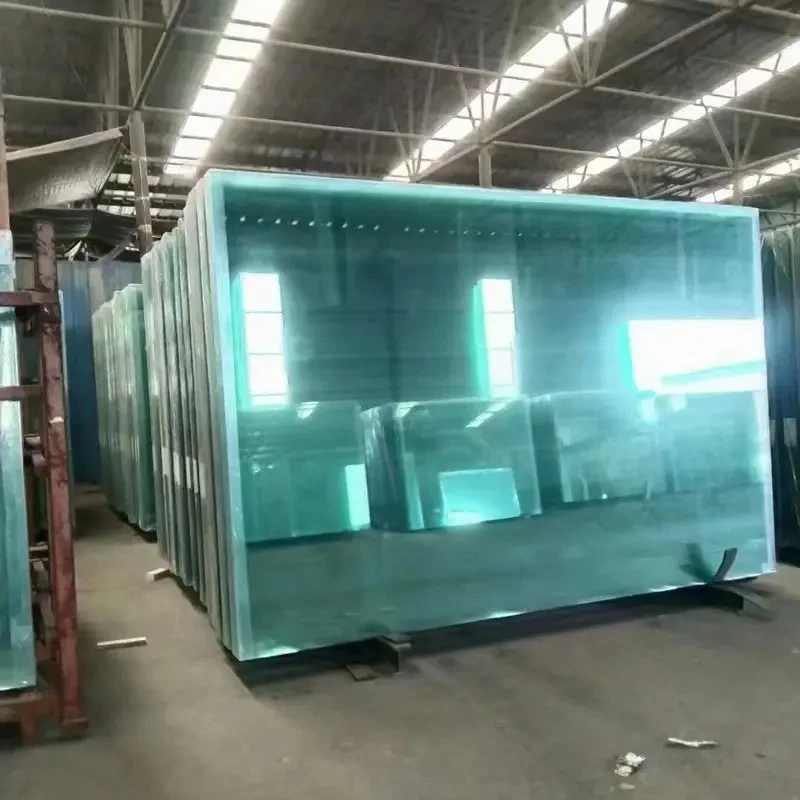The concept of float glass, often regarded as a cornerstone in the modern glass-making industry, signifies a revolutionary process that has dramatically redefined glass production. My journey through various manufacturing facilities and close consultations with industry experts have provided me with invaluable insights into how float glass is crafted, its applications, and its vital importance across multiple sectors.

Introduced in the mid-20th century, float glass is produced by floating molten glass on a bed of molten tin. This method yields a perfectly flat, uniform sheet, eliminating the need for polishing and grinding. The outcome is a high-quality glass with superior clarity and smoothness, characteristics that make it indispensable in various applications such as architectural glazing, automotive windows, and even solar panels.
Working closely with manufacturers, I have observed the nuances of the float glass production process. The molten glass, heated to approximately 1,100 degrees Celsius, is meticulously poured onto molten tin. The perfectly flat surface of the tin supports the glass as it cools and solidifies, resulting in an impeccably smooth finish. This method is not only cost-effective but also significantly reduces production time, offering a considerable competitive advantage.

The expertise gained from my professional engagements underscores the importance of selecting the right raw materials. High-quality sand, soda ash, and limestone are combined in precise ratios to achieve the desired properties of the final product. Variations in these components can lead to different qualities of float glass, catering to distinct customer requirements. This versatility is one of the reasons float glass is heralded as an essential material in today's market.
float glass meaning
As an advocate of sustainable practices, float glass production's environmental impact has been an area of particular interest. Through rigorous research and interaction with leading sustainability experts, I've learned about innovations aimed at reducing the carbon footprint of float glass production. For instance, improvements in furnace efficiency and recycling strategies for cullet glass (recycled glass) have been instrumental in minimizing environmental impact, aligning with global sustainability goals.
Trust in float glass is fortified by its widespread endorsement across industries. Builders and architects consistently choose float glass for its unrivaled transparency, strength, and versatility. Its ability to provide unobstructed views and protection against external elements while enhancing aesthetic appeal makes it an industry favorite. Similar testimonials from the automotive sector highlight float glass's safety features and durability under various conditions, further attesting to its authority as a reliable material.
In the realm of renewable energy, float glass plays a crucial role in the efficiency of solar panels. Our discussions with experts in solar technology reveal that the optical properties of float glass enhance light transmission, significantly boosting the performance of photovoltaic cells. This application is an excellent example of how float glass bridges traditional material use with emerging technologies.
By synthesizing extensive field experience, technical expertise, and authoritative industry knowledge, this exploration of float glass brings to light the importance and complexity of a seemingly simple material. The continued evolution and implementation of float glass not only bear testament to its enduring relevance but also speak volumes about the innovation driving the glass-making industry towards a more sustainable and efficient future.
 Afrikaans
Afrikaans  Albanian
Albanian  Amharic
Amharic  Arabic
Arabic  Armenian
Armenian  Azerbaijani
Azerbaijani  Basque
Basque  Belarusian
Belarusian  Bengali
Bengali  Bosnian
Bosnian  Bulgarian
Bulgarian  Catalan
Catalan  Cebuano
Cebuano  Corsican
Corsican  Croatian
Croatian  Czech
Czech  Danish
Danish  Dutch
Dutch  English
English  Esperanto
Esperanto  Estonian
Estonian  Finnish
Finnish  French
French  Frisian
Frisian  Galician
Galician  Georgian
Georgian  German
German  Greek
Greek  Gujarati
Gujarati  Haitian Creole
Haitian Creole  hausa
hausa  hawaiian
hawaiian  Hebrew
Hebrew  Hindi
Hindi  Miao
Miao  Hungarian
Hungarian  Icelandic
Icelandic  igbo
igbo  Indonesian
Indonesian  irish
irish  Italian
Italian  Japanese
Japanese  Javanese
Javanese  Kannada
Kannada  kazakh
kazakh  Khmer
Khmer  Rwandese
Rwandese  Korean
Korean  Kurdish
Kurdish  Kyrgyz
Kyrgyz  Lao
Lao  Latin
Latin  Latvian
Latvian  Lithuanian
Lithuanian  Luxembourgish
Luxembourgish  Macedonian
Macedonian  Malgashi
Malgashi  Malay
Malay  Malayalam
Malayalam  Maltese
Maltese  Maori
Maori  Marathi
Marathi  Mongolian
Mongolian  Myanmar
Myanmar  Nepali
Nepali  Norwegian
Norwegian  Norwegian
Norwegian  Occitan
Occitan  Pashto
Pashto  Persian
Persian  Polish
Polish  Portuguese
Portuguese  Punjabi
Punjabi  Romanian
Romanian  Russian
Russian  Samoan
Samoan  Scottish Gaelic
Scottish Gaelic  Serbian
Serbian  Sesotho
Sesotho  Shona
Shona  Sindhi
Sindhi  Sinhala
Sinhala  Slovak
Slovak  Slovenian
Slovenian  Somali
Somali  Spanish
Spanish  Sundanese
Sundanese  Swahili
Swahili  Swedish
Swedish  Tagalog
Tagalog  Tajik
Tajik  Tamil
Tamil  Tatar
Tatar  Telugu
Telugu  Thai
Thai  Turkish
Turkish  Turkmen
Turkmen  Ukrainian
Ukrainian  Urdu
Urdu  Uighur
Uighur  Uzbek
Uzbek  Vietnamese
Vietnamese  Welsh
Welsh  Bantu
Bantu  Yiddish
Yiddish  Yoruba
Yoruba  Zulu
Zulu 


